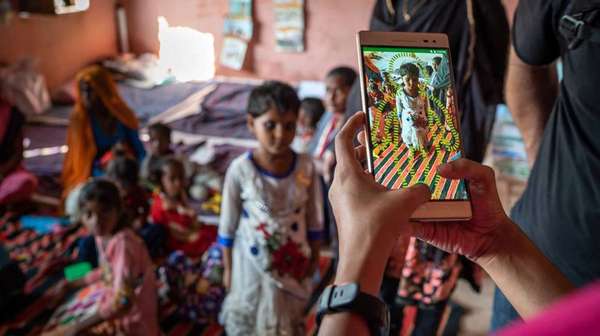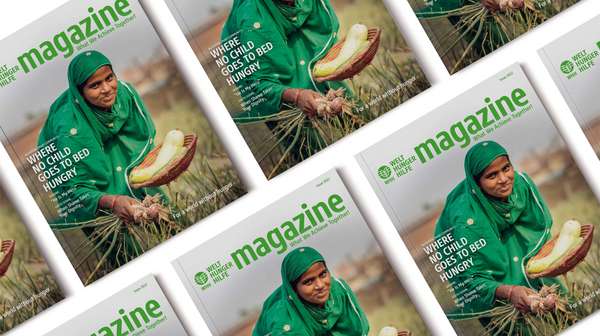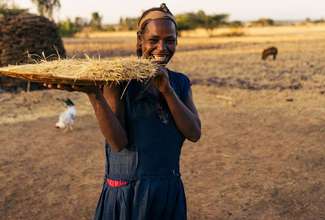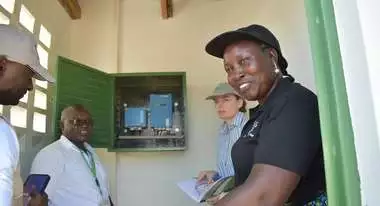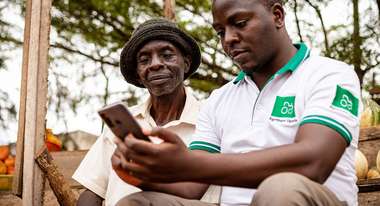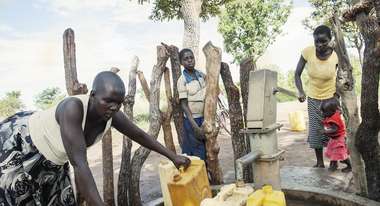Sharing ideas and scaling impact: Welthungerhilfe (WHH) works with global partnerships and social entrepreneurship to benefit people living in poverty.
SPOUTS of Water: Ingenious, Healthy, and a Gain for Everyone
A small social business is solving a huge problem: The Ugandan company SPOUTS of Water produces ceramic filters from local clay. Welthungerhilfe and its cooperation partner Viva con Agua have invested in the company.
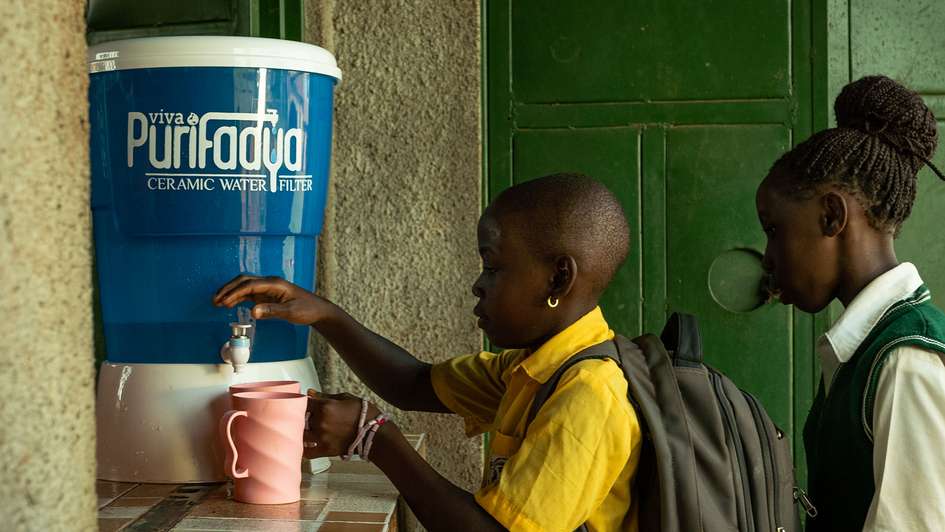
Irene Kamwanya is the chef in the kitchen of Jehova Primary School in the Ugandan village of Kikajjo. “The children used to drink water directly from the tap or the well,” she recalls. “They often complained of diarrhoea and constantly had stomach aches.” Contaminated water causes many severe diarrhoeal diseases; it is even the second-most-common cause of death for children under five years of age.
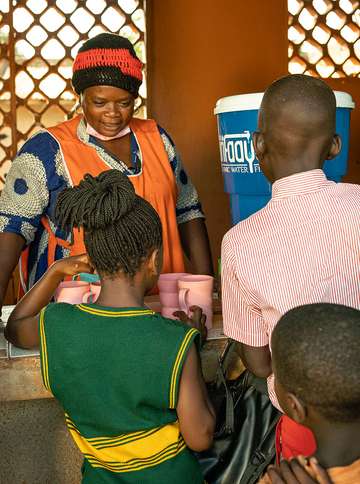
To address this issue at the school, Irene Kamwanya used to boil water over an open charcoal fire, as is common practice in around 40 percent of households in Uganda. “However, that took up almost all my time, and I could barely breathe because of the smoke,” she says. Her days look different now. In the morning, she pours water into a filter and then moves on to her other tasks – and the children already have clean drinking water during their ten o’clock break.
The key to this solution is a 40-minute drive away in the Ugandan capital, Kampala, where a small business has taken on a big task. “Our mission is to provide all people in East Africa with clean drinking water,” says Daniel Yin, the CEO of SPOUTS of Water, which manufactures ceramic filters. The principle underlying the filters is as old as it is efficient: Clay is mixed with small sawdust particles and formed into pots. At high temperatures, the sawdust burns off in the kiln, leaving behind tiny pores in the clay. These allow the water to drip down into a container below but do not let the germs through.
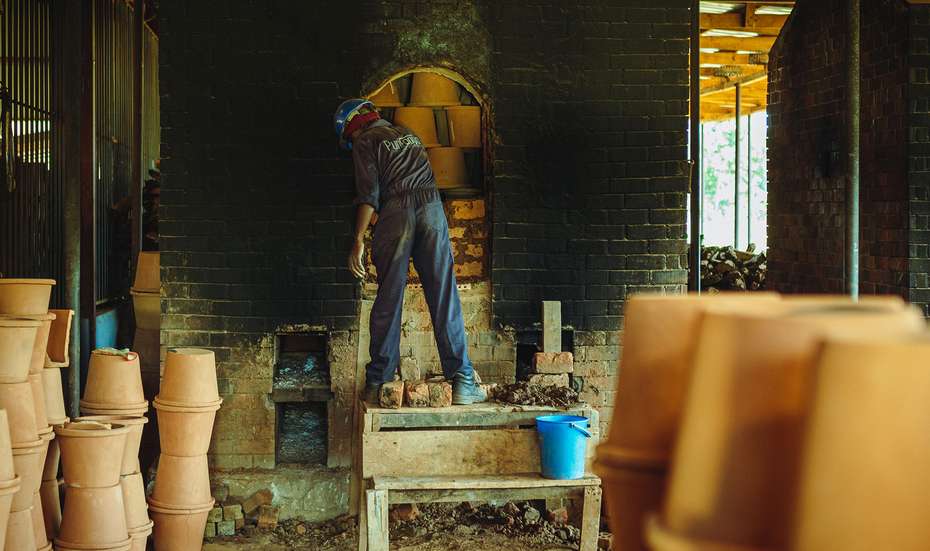
Up to 5.5 litres of water can be filtered every hour. With a layer of silver nitrate further disinfecting the water, the filters are 99.9 percent effective, which is as high as boiled water or purified water in bottles. The filters last for at least two years and are simple to clean. The cheapest model costs around 25 euros.
Investing in a Social Business
They are safe, and they are cheap. People can afford to have one at home, which also saves the expense of buying charcoal to boil water.
Christopher Munguleni Employee in the SPOUTS production siteChristopher Munguleni works in the company’s production site and is a big proponent of the filters. “They are safe, and they are cheap. People can afford to have one at home, which also saves the expense of buying charcoal to boil water,” he says. SPOUTS of Water is the only producer of filters in Uganda and one of the largest in Africa. It was founded by two Harvard students.
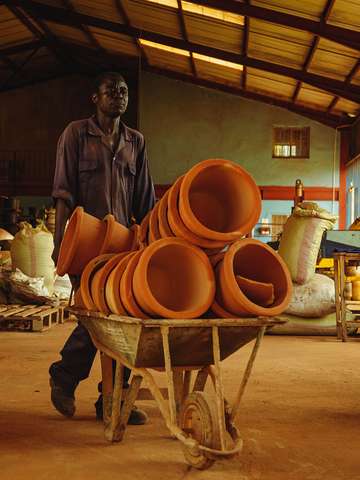
Welthungerhilfe and long-time cooperation partner Viva con Agua have been working with SPOUTS of Water since 2019. They employ the filters in a variety of projects focused on water, sanitation, and hygiene. A trusting business relationship has grown over time, and they decided to buy into the business together in order to make further expansion possible. As of last year, Welthungerhilfe and Viva con Agua hold a combined 30 percent of the company’s shares, each with 15 percent. This deal turned donations into investments.
What does that really mean, and why is Welthungerhilfe pursuing this approach? “The key term is ‘social business’,” explains Florian Landorff, the head of Welthungerhilfe’s Innovation Team. “With this approach, companies solve social and environmental problems. Profits do not go to investors but are reinvested to further the business’s social objective. This makes our participation a type of impact investing. The goal of our investment is for the social business to have a positive impact on society and the environment in addition to making a financial return,” says Florian Landorff.
Ideally, the company will expand over time and multiply its impact, thereby offering people long-term opportunities and sustainable structures after the project ends and without requiring further funding. Under these criteria, SPOUTS of Water is a textbook example of a social business.
The filters’ health benefits are directly measurable, with incidences of diseases caused by contaminated water falling not only in Jehova Primary School but everywhere where the filters are used. “Since 2015, we have sold 70,000 filters, which are providing 400,000 people with long-term access to safe water,” reports Daniel Yin. This represents a significant contribution to a healthier life and to reducing Uganda’s disease-related productivity loss, which is estimated to amount to USD 170 million every year. Similarly, this also improves school attendance, education, and future opportunities.
Clean Technology
More than 100 employees have signed long-term employment contracts with fair salaries and good working conditions at SPOUTS of Water. In addition, many women have become commercial representatives and improved their finances by selling the filters. The environment benefits too. “We use up to 99 percent local raw materials,” explains Daniel Yin. “This saves on transportation and consequently reduces CO2 emissions as well.”
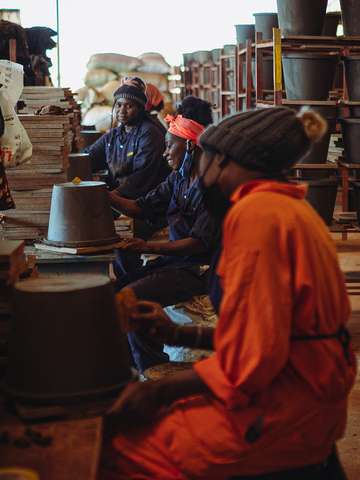
The greatest CO2 reduction, however, comes from people using less wood and energy to boil water. SPOUTS of Water is able to provide comprehensive calculations to prove all of this and is therefore entitled to issue and sell CO2 certificates. This is hoped to provide additional income in the future. Further plans include growing the product selection and expanding sales to other East African countries.
Welthungerhilfe and Viva con Agua have a right to participate in all major decisions and are represented on the executive board in order to influence the company’s direction and to ensure that their own organisations’ objectives are taken into consideration. Locally, one of the greatest challenges is to change attitudes and habits. “Most people have boiled water all their lives, as have their parents and grandparents,” says Daniel Yin. “Now, they have to be convinced that this alternative offers a solution to a problem they face on a daily basis.”
The Welthungerhilfe Magazine 2022 in English with selected articles from the four German language issues of the past year.
Christian Wiebe, the divisional manager for water projects at Viva con Agua, is confident that the approach will succeed, saying, “We believe that social entrepreneurship can create independent structures beyond the traditional development cooperation and enable profound change to take place. Developing and supporting social businesses is the key to a long-term impact that far exceeds the limits of project funding periods.”
This article was taken from Welthungerhilfe Magazine 2022.




